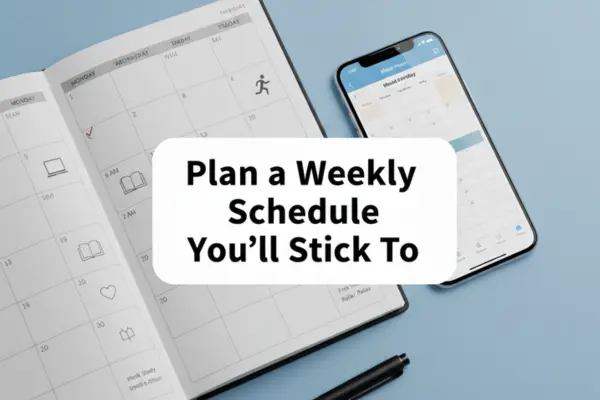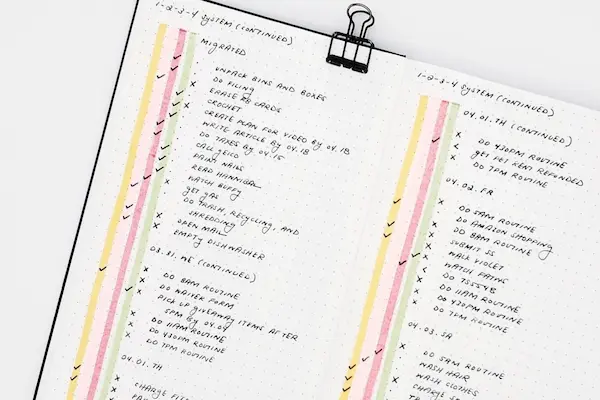Discover how to plan weekly schedule that’s simple, practical, and easy to follow, helping you stay organized and stress-free.
Creating a weekly schedule that really works may seem impossible.
Many times, we even start motivated, but soon we get lost between tasks, commitments, and distractions.
As a result, the days go by quickly, and the feeling is that nothing was accomplished.
But the truth is that there is a practical and realistic way to organize your week.
And the best part: without complication, without complex methods, and in a way that anyone can follow.
In this article, you will learn step by step how to plan weekly schedule in a way that works in real life, bringing more clarity, focus, and peace of mind to your routine.
And believe me, when you see your days organized, everything feels lighter and easier to accomplish.

Understanding how to plan weekly schedule
First of all, it’s important to understand what it really means to plan a week consistently.
Planning is not about filling your agenda with impossible commitments.
Actually, it’s the opposite: it’s about choosing the right priorities and organizing activities in an order that makes sense for you.
The goal is not to have a rigid life but to create a map that helps you reach the end of the week with a sense of achievement.
- Planning gives clarity about what to do and when to do it.
- Helps avoid forgetfulness and delays.
- Allows you to balance obligations with leisure moments.
- Gives more control over unexpected events.
- Reduces stress caused by disorganization.
Benefits of how to plan weekly schedule
When you learn how to plan weekly schedule, the benefits appear quickly.
You gain time, increase productivity, and also feel calmer every day.
In addition, organizing your week helps you realize that life is not just about work.
There is also space for rest, family, and fun.
- More focus on important tasks.
- Less anxiety about deadlines.
- Better use of free time.
- Greater discipline without losing flexibility.
- Constant sense of progress.
Common challenges and how to avoid them
It’s normal to face difficulties at the beginning.
Many people get excited and put too many tasks in the same day.
Others give up because they don’t follow the schedule exactly and think they failed.
But the key is to adjust, not abandon the plan.
- Unrealistic expectations → Create smaller and achievable goals.
- Lack of habit → Reserve 10 fixed minutes to plan.
- Constant interruptions → Separate focus blocks without distractions.
- Procrastination → Use alarms and break big tasks into smaller steps.
- Digital disorganization → Centralize notes in a single app or planner.
Tools and platforms for how to plan weekly schedule
Today, there are many tools that can make the process easier.
You can choose the one that best fits your lifestyle, whether on paper or mobile.
The important thing is that it’s simple and always accessible.
| Platform | Access | Main features | Ideal for |
|---|---|---|---|
| Google Calendar | Web and phone | Reminders, colors, sync | Who likes a modern and easy visual |
| Trello | Web and app | Boards, lists, and cards | Who prefers to organize by categories |
| Paper planner | Paper | Manual writing, quick overview | Who likes to write and check off tasks |
| Notion | Web and app | Blocks, database, customization | Who wants everything centralized |
The secret is not to complicate.
If an app gets in the way more than it helps, go back to basics.
The essential thing is to have clarity on where your weekly plan is.
How to plan weekly schedule: step by step
Now it’s time to get hands-on.
With a few simple steps, you create a weekly schedule that really works.
- Define your priorities for the week: choose 3 to 5 main points that need attention.
- Separate time blocks: group similar tasks close together.
- Include fixed commitments: mark work hours, studies, or appointments.
- Leave space for unexpected events: keep free windows for emergencies.
- Add personal activities: include rest, leisure, and health care.
- Use colors or categories: this makes quick visualization easier.
- Review on Sunday: check the plan before the week starts and adjust if necessary.
How to plan weekly schedule with balance and flexibility
A common mistake is to think that planning means locking your routine.
In fact, flexibility is essential for the plan to be sustainable.
That’s why you should treat the schedule as a guide, not as a prison.
If something goes off track, just reorganize the rest.
The important thing is to keep the rhythm and not give up.
- Include strategic breaks to rest.
- Alternate heavy tasks with lighter activities.
- Always have a margin of time between commitments.
- Adjust your plan as new demands appear.
- Remember: consistency matters more than perfection.
How to plan weekly schedule for work and personal life
A truly effective weekly schedule is not limited to professional tasks.
It also needs to give space for your personal life, because there is no real success in being productive at work while neglecting family, health, or leisure.
Balance between these areas is what brings long-term satisfaction and well-being.
When planning, think of your week as a whole, where professional goals and personal needs coexist in harmony.
This way, you avoid overload and create a routine that feels sustainable.
Start by defining your work commitments clearly, setting realistic daily goals and respecting your most productive hours.
Then, distribute other important aspects of life across the week, ensuring that none are left out.
Here are some areas to focus on:
- Work: set daily goals and concentrate during your peak hours of productivity.
- Studies: spread subjects or topics throughout the week so you don’t overload a single day.
- Family: reserve fixed times to be present with loved ones, free of interruptions.
- Health: schedule workouts, check-ups, and time to prepare homemade meals that care for your body.
- Leisure: choose activities that recharge your energy and bring joy, whether it’s a hobby, a walk, or a moment of rest.
The secret is to treat each of these areas as equally important.
By doing so, your weekly schedule becomes a tool not only for organization but also for living a more complete, balanced, and satisfying life.
How to plan weekly schedule using time blocks
A powerful technique to keep discipline is using time blocks.
In it, you divide the day into blocks and assign a type of activity to each period.
This way, you avoid switching tasks all the time and keep concentration.
For example, you can have a block just for answering messages, another for meetings, and another for creating content.
The result is more focus and less distraction.
- Deep focus block: 2 hours for important tasks.
- Review block: 30 minutes to check progress.
- Administrative block: 1 hour for bureaucracy and emails.
- Rest block: short breaks to recover energy.
- Personal block: moments dedicated to leisure and health.
How to plan weekly schedule when life feels chaotic
There are weeks when everything seems out of control.
At these times, planning becomes an even stronger ally.
Even if you can’t control everything, a schedule helps keep your feet on the ground.
The secret is to simplify as much as possible.
Choose only three priorities per day and accept that the rest can wait.
This way, you keep balance without frustration.
- List non-negotiable commitments.
- Choose one main task per day.
- Delegate what doesn’t need to be done by you.
- Take time to breathe, even on busy days.
- Use your planner as support, not as a burden.
How to plan weekly schedule and stay motivated
Planning your week may be simple, but keeping motivation alive is what truly guarantees results.
Without the right drive, even the best schedule ends up forgotten.
That’s why it’s so important to combine organization with strategies that inspire you to keep going.
Small incentives, recognition of progress, and meaningful rewards make the journey lighter and more enjoyable.
Celebrate every task you finish, no matter how small, and acknowledge your weekly progress.
When you see results piling up, motivation grows naturally.
And as you get more comfortable with the routine, planning the next week stops feeling like a chore and becomes a habit you look forward to.
Practical ways to stay motivated include:
- Use checklists to mark achievements and enjoy the satisfaction of ticking items off.
- Share your goals with someone you trust so you feel supported and accountable.
- Reward yourself with small pleasures at the end of the week, like a favorite meal or some extra leisure time.
- Focus on long-term benefits such as more free time, less stress, and steady progress, instead of only the effort of each day.
- Always remember that consistency matters more than perfection — even small steps done regularly bring big results over time.
With this approach, planning your week becomes more than a task.
It turns into a cycle of discipline, reward, and motivation that makes each week lighter and more productive.
Best practices for how to plan weekly schedule
Good planning goes beyond writing down a long list of tasks.
What makes the difference is adopting small habits that you can repeat every week.
Choose a fixed day to prepare your plan, keep all notes in one place, and review daily what was accomplished.
Remember to stay flexible, add short breaks, and use reminders to stay on track.
At the end of the week, evaluate what worked and what needs improvement.
And most importantly, leave space for leisure and health so your schedule stays balanced and sustainable.
In short, the best practices of how to plan weekly schedule focus on simplicity, consistency, and balance.





